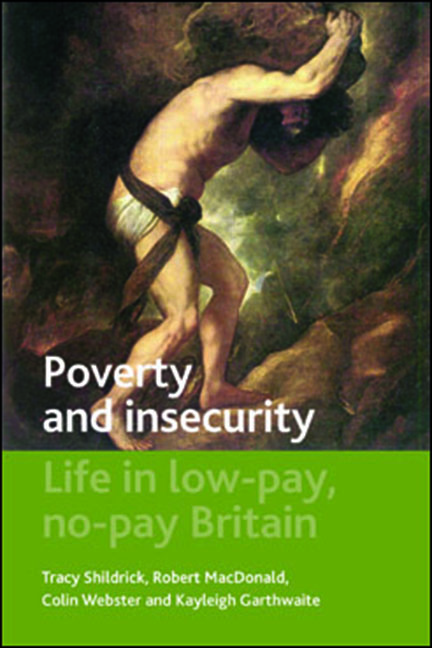Book contents
- Frontmatter
- Contents
- List of figures and boxes
- Acknowledgements
- 1 Introduction
- 2 Poor work, welfare and poverty
- 3 Researching the low-pay, no-pay cycle and recurrent poverty
- 4 The low-pay, no-pay cycle: the perspectives and practices of employers and ‘welfare to work’ agencies
- 5 The low-pay, no-pay cycle: its pattern and people's commitment to work
- 6 Searching for jobs: qualifications, support for the workless and the good and bad of informal social networks
- 7 Poor work: insecurity and churning in deindustrialised labour markets
- 8 ‘The ties that bind’: ill health and caring and their impact on the low-pay, no-pay cycle
- 9 Poverty and social insecurity
- 10 Conclusions
- References
- Index
2 - Poor work, welfare and poverty
Published online by Cambridge University Press: 07 September 2022
- Frontmatter
- Contents
- List of figures and boxes
- Acknowledgements
- 1 Introduction
- 2 Poor work, welfare and poverty
- 3 Researching the low-pay, no-pay cycle and recurrent poverty
- 4 The low-pay, no-pay cycle: the perspectives and practices of employers and ‘welfare to work’ agencies
- 5 The low-pay, no-pay cycle: its pattern and people's commitment to work
- 6 Searching for jobs: qualifications, support for the workless and the good and bad of informal social networks
- 7 Poor work: insecurity and churning in deindustrialised labour markets
- 8 ‘The ties that bind’: ill health and caring and their impact on the low-pay, no-pay cycle
- 9 Poverty and social insecurity
- 10 Conclusions
- References
- Index
Summary
Introduction
This chapter aims to locate our particular empirical case study of the low-pay, no-pay cycle and recurrent poverty within wider debates and research about poor work, welfare and poverty. It is followed, in Chapter 3, by a discussion of the particular place of study – Middlesbrough in Teesside, North East England – and how broad-based and wide-ranging political, economic and social changes documented in this chapter have played out in Teesside.
We begin by situating the study within a wider programme and growing body of research that is interested in the dynamic study of poverty and working lives, noting that many of the findings and conclusions presented in this book are ones which, in general terms, find support in some other recent research. In the second part of the chapter we turn to the important business of defining some key terms for this discussion of, and debates about, changing forms of work. How we might define, and what we know about, trends in respect of ‘low-paid work’, the ‘low-pay, no-pay cycle’, ‘precarious work’ and ‘poor work’ in Britain are the foci. We carry this forward into the third part of the chapter by examining the idea that precariousness in work, and in people's wider lives, has risen dramatically to the point that we can now talk of a new class called ‘the precariat’. Here we also begin to reflect on the extent to which the research participants, and their experiences of work and welfare, match what is claimed about this new condition and class. In the fifth part, our attention is less on the labour market and more on poverty and welfare. We provide a brief historical review of how ‘the poor’ and poverty have been regarded and dealt with in public policy and welfare provision. Here we show how the long history of English responses to poverty and insecurity are often unacknowledged by policy makers and politicians, in particular how the mistakes of the past have come to haunt the policy present. In the final part, and more theoretically, we debunk some important myths about how labour markets work, myths that underpin welfare to work policies and their reliance on a one-sided commitment to supply-side solutions to worklessness and poverty.
- Type
- Chapter
- Information
- Poverty and InsecurityLife in Low-Pay, No-Pay Britain, pp. 11 - 38Publisher: Bristol University PressPrint publication year: 2012



